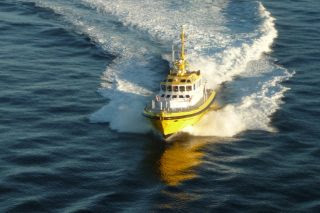The Canadian Government is planning to introduce new
legislation to modernize Canada’s pilotage service for commercial ships.
legislation to modernize Canada’s pilotage service for commercial ships.
The government has indicated that the amendments will focus on
strengthening the governance of pilotage authorities, strengthening enforcement
provisions, streamlining fee-setting and increasing transparency.
strengthening the governance of pilotage authorities, strengthening enforcement
provisions, streamlining fee-setting and increasing transparency.
The Canadian Chamber of Marine Commerce (CMC) welcomed the Federal
Budget plan, noting that the system has not been overhauled in 45 years.
Budget plan, noting that the system has not been overhauled in 45 years.
“Pilotage costs in Canada are out
of control and have a long history of increasing at rates that far exceed
inflation,” said Bruce Burrows,
president of the Chamber of Marine Commerce.
of control and have a long history of increasing at rates that far exceed
inflation,” said Bruce Burrows,
president of the Chamber of Marine Commerce.
“This government-mandated service
has for decades been provided by monopolistic entities with little
accountability or input from ship operators and their customers – despite the
fact that it is paid for by industry fees – costs passed ultimately to
consumers.”
has for decades been provided by monopolistic entities with little
accountability or input from ship operators and their customers – despite the
fact that it is paid for by industry fees – costs passed ultimately to
consumers.”
In ports and other specific channels, ships are mandated by law to
have a pilot come on board to help with navigation. Most of the 3,700-kilometer
Great Lakes-St. Lawrence waterway is within a mandatory pilotage zone as are
other areas along the east and west coasts of Canada.
have a pilot come on board to help with navigation. Most of the 3,700-kilometer
Great Lakes-St. Lawrence waterway is within a mandatory pilotage zone as are
other areas along the east and west coasts of Canada.
The rationale is that a Canadian-licensed pilot will navigate the
challenging areas where the ships’ crew may not have traveled often and know
the potential hazards. This is an important safety measure, however, problems
exist on how the service works.
challenging areas where the ships’ crew may not have traveled often and know
the potential hazards. This is an important safety measure, however, problems
exist on how the service works.
As explained by CMC, with just over 400 pilots in Canada, pilotage
is managed by four federal crown corporations, each with their own set of
regulations, operational procedures and management practices.
is managed by four federal crown corporations, each with their own set of
regulations, operational procedures and management practices.
CMC added that in many of the pilotage zones, archaic and
cumbersome rules make it almost impossible for domestic ship masters and mates
to be certified to pilot their own vessels, despite having similar local
knowledge and expertise and having access to state-of-the-art navigation and
traffic control management systems.
cumbersome rules make it almost impossible for domestic ship masters and mates
to be certified to pilot their own vessels, despite having similar local
knowledge and expertise and having access to state-of-the-art navigation and
traffic control management systems.
Ship operators, ports and customers alike are pushing a host of
reforms, including having the government create a standardized and improved
certification program for domestic crews across Canada.
reforms, including having the government create a standardized and improved
certification program for domestic crews across Canada.
According to CMC, fees, salaries and benefits paid to licensed
pilots averaged CAD 376,500 (USD 282,209) per pilot in 2016, increasing 3.4
times more than CPI over the last five years.
pilots averaged CAD 376,500 (USD 282,209) per pilot in 2016, increasing 3.4
times more than CPI over the last five years.
On the St. Lawrence River, for example, the
hourly cost of pilotage exceeds the total cost of the entire crew of a vessel.
hourly cost of pilotage exceeds the total cost of the entire crew of a vessel.
World Maritime News.


































































